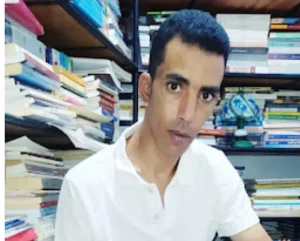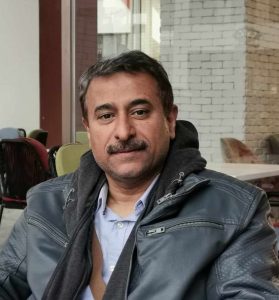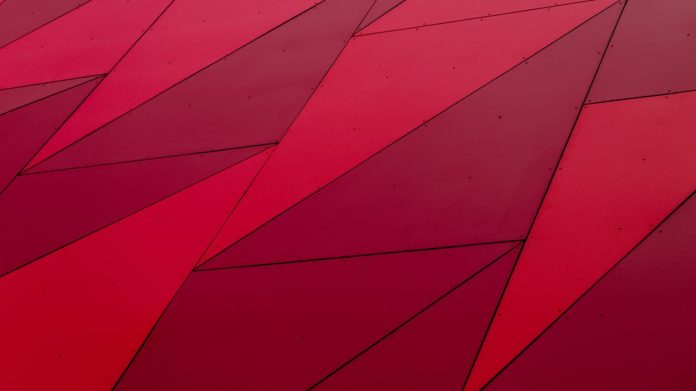Translated from the Arabic by Essam M. Al-Jassim
He was sitting there, and I was sitting here. He reached out toward something I couldn’t see as I extended my hand toward the book I was holding, ready to turn the page. He’s copying me. I contemplated the scene that lay before me, narrowing my eyes. How could that be? He moved his hand before I did—turning the page of his invisible book before I could turn mine.
He was a handsome young man despite his unruly hair, shaggy mustache, and long-neglected beard. By comparison, I was sleek, with my clean-shaven face—or at least, that’s what I thought. I paused, catching my reflection in the large mirrors mounted beside the café’s awnings. My shirt gleamed a brilliant white in the sunlight, reflecting off the polished tiles. Not bad looking either, I mused.
The other patrons of the café and I could see him sitting across the street on the sidewalk, cradling and staring down at his imaginary book. He must be reading something profound, I decided, rolling my eyes. I glanced down at my book, stealing an occasional look at him between pages. I refocused on the transformations in geometry’s history, appreciating the challenging shift from Euclidean to non-Euclidean methods and the societal changes that accompanied it.
Soon, I sensed something was off. Something had shifted in my mind. Meanings were slowly slipping from the grip of my thoughts, like sand seeping through the gaps between my fingers. I felt myself drifting into a stupor, detaching from my surroundings. I tried to grasp what was happening, chasing after elusive concepts: spherical and sectional surfaces. A brief smirk tugged at my lips. Riemann, you tricky thing. How can two parallel lines ever intersect?
A sudden noise jerked me back to reality. I lifted my head and saw him, equally lost in his own world. I glared at him, my gaze locked on the light in his eyes, trying to decipher any hint of his inner thoughts.
A young boy, part of a group of children, ran past with his arms outstretched as he chased a butterfly. His laughter was infectious, his innocence shining like a beacon. I blinked, and in that instant, he morphed into a young man. His vitality was already fading as he trudged back and forth between an isolated house on the outskirts of the village and a distant school in the south.
I narrowed my eyes, and he appeared to freeze in place, his lips curled in defiance. An enraged young man, fist raised high, chanting along with others, “The people want…!” I nodded and gave a bitter smile, feeling like a soldier stepping on a submerged mine. My lips twisted into a wry, despairing smile as the young man’s raised fist echoed the earlier child’s outstretched hands. Burning with fury, his bitterness perfectly mirrored the hopeful enthusiasm and creativity that had once shone alive in the child’s gaze.
Something bubbled up inside me, caught in the confines of my throat. I coughed, snapping out of my reverie. When I looked again across the street, I found him mirroring my intense gaze as though trying to peer into the depths of my soul. Heat crept up my neck, discomfort swelling within me. I opened my mouth to speak, but he shook his head.
“We weren’t chasing a butterfly,” he said. “Our childish naivety only made it seem so. It was just a colorful scrap of paper!” He held my stare for a moment longer. I thought he was on the verge of tears. “Just a piece of colored paper,” he muttered, defeated.
As he stood, I felt myself rise involuntarily. My body mimicked his movements as if were puppet controlled by invisible strings. I grabbed my collar as he did, and we both tugged forcefully until the buttons on our shirts sprang open with a faint pop. Darkness enveloped us—enveloped everything. The unbearable, merciless weight of existence had vanished.
When I regained consciousness, I was lying near the sidewalk, surrounded by the shuffling feet of strangers and their whispered commentaries.
“Poor thing! What happened to him?” cried an old woman.
“It’s normal,” replied the waiter. “He always has these hysterical fits that end up in fainting.”
“Look at him! Is he crazy?”
He nodded. “I heard he lost his mind after losing the thread of hope that binds the inside out. He couldn’t hold onto what was left of his sanity.”
About the Author

Es-said Skhiri is a Moroccan short story writer who holds a Master’s degree in Philosophy. Many of his short stories have received critical acclaim and literary prizes.
About the Translator

Essam M. Al-Jassim is a Saudi writer and translator based in Jubail, Saudi Arabia. His writings and translations have been featured nationally and internationally in various Arabic and English-language literary journals. He is the translator and editor of the recently published anthology of flash fiction: Furtive Glimpses: Flash Fiction from The Arab World.












